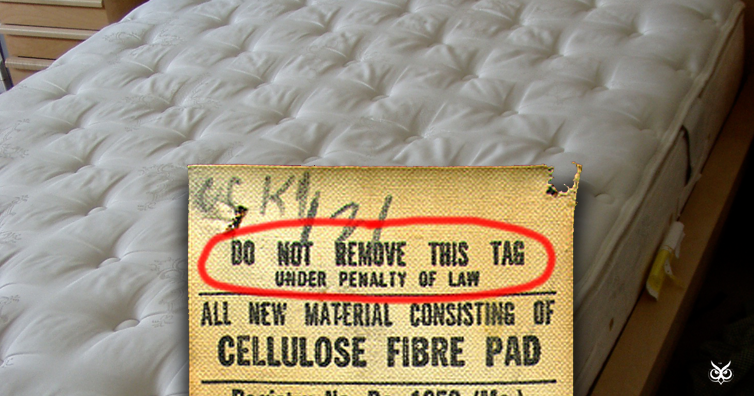- Good Sam Community
- Everything RV
- RV Tips & Tricks
- Re: Traveling with Propane on
- Subscribe to RSS Feed
- Mark Topic as New
- Mark Topic as Read
- Float this Topic for Current User
- Bookmark
- Subscribe
- Mute
- Printer Friendly Page
Traveling with Propane on
- Mark as New
- Bookmark
- Subscribe
- Mute
- Subscribe to RSS Feed
- Permalink
- Report Inappropriate Content
Jun-29-2022 04:48 PM
- Labels:
-
Seeking Advice
- Mark as New
- Bookmark
- Subscribe
- Mute
- Subscribe to RSS Feed
- Permalink
- Report Inappropriate Content
Jul-01-2022 10:52 AM
toedtoes wrote:It is very clear the tag must remain on for disclosure to the end user. Would have helped if it said the end user could remove. BTW mine have all been removed 😉
I know it was a joke. It's just one that annoys the heck out of me because so many people REALLY BELIEVE they cannot cut the tags off pillows, etc.
If the fridge was required to be off while in motion there would be a tag or an automatic valve.
- Mark as New
- Bookmark
- Subscribe
- Mute
- Subscribe to RSS Feed
- Permalink
- Report Inappropriate Content
Jul-01-2022 10:20 AM
toedtoes wrote:opnspaces wrote:
Why are people only concerned about that tiny refrigerator pilot light when fueling and not that much larger water heater flame, or possibly the furnace flame?
Because most people don't ever have a desire or need to run the water heater or furnace while driving. They don't need the hot water while driving and they use the cab heat in the motorhome or the tow vehicle to keep warm.
The fridge comes up in question because people want to use it to keep their food cold while driving for 4+ hours.
This wasn't true for us when we had our previous MH's. We ran the furnace when travelling in winter to keep the whole MH warm and pipes from freezing. We've also used hot water while en route. I always turned these things off when fueling however. I was never comfortable with an open flame while fueling however small the risk.
Jeff - 2023 FR Sunseeker 2400B MBS
- Mark as New
- Bookmark
- Subscribe
- Mute
- Subscribe to RSS Feed
- Permalink
- Report Inappropriate Content
Jul-01-2022 09:53 AM
opnspaces wrote:
Why are people only concerned about that tiny refrigerator pilot light when fueling and not that much larger water heater flame, or possibly the furnace flame?
Because most people don't ever have a desire or need to run the water heater or furnace while driving. They don't need the hot water while driving and they use the cab heat in the motorhome or the tow vehicle to keep warm.
The fridge comes up in question because people want to use it to keep their food cold while driving for 4+ hours.
1998 American Clipper Fold n Roll Folding Trailer
Both born in Morgan Hill, CA to Irv Perch (Daddy of the Aristocrat trailers)
- Mark as New
- Bookmark
- Subscribe
- Mute
- Subscribe to RSS Feed
- Permalink
- Report Inappropriate Content
Jul-01-2022 08:42 AM
Surgtech94 wrote:
Thank you everyone for the information. Yes, forgot our fridge was Automatic. But I believe I have to turn propane on and light stove to make sure propane is flowing to fridge? How do I know if fridge ignited on propane? TY
Why are people only concerned about that tiny refrigerator pilot light when fueling and not that much larger water heater flame, or possibly the furnace flame?
That being said I only turn off the propane in storage.
Your refrigerator will keep cold for hours when turned off.
Your refrigerator will run for many minutes on residual pressure in the lines when you turn the bottles off.
If you are concerned then go into the trailer and slide the refrigerator switch over to OFF so the auto igniter doesn't activate while you are refueling.
Once done fueling if there is not a huge puddle of gasoline on the ground then go slide the switch back to AUTO and drive away.
You should only need to run the stove burners when you first take the RV out of storage. If you turn off the refrigerator at the switch then the LP line will remain full and pressurized eliminating the need to purge again.
I really can't remember the last time I actually smelled any gasoline while refueling my vehicles. But then California has some pretty efficient vapor recovery at the pumps to help reduce smog.
I know of two ways to verify that the refrigerator is actually lit and running.
There is a little LED next to the switch that is on when its running on Propane. If the flame goes out the light starts blinking
Flip the controls to LP or GAS and walk outside and stick your ear next to the refrigerator access panel. If the flame is on you should hear a dull roar.
2001 Suburban 4x4. 6.0L, 4.10 3/4 ton **** 2005 Jayco Jay Flight 27BH **** 1986 Coleman Columbia Popup
- Mark as New
- Bookmark
- Subscribe
- Mute
- Subscribe to RSS Feed
- Permalink
- Report Inappropriate Content
Jul-01-2022 08:35 AM
time2roll wrote:valhalla360 wrote:I think it is caution for if there is a wreck. All traffic could be stopped and blocked with propane leaking.
Of course, if that's the case, it has a ventilation system so the heavier than air CO2 doesn't build up...not to mention vehicles cruising at 30-60mph will move a surprising amount of air.
Mostly, it's a CYA.
When you understand how check valves on LP bottles work, come back and revise your response....
2017 Heartland Torque T29 - Sold.
Couple of Arctic Fox TCs - Sold
- Mark as New
- Bookmark
- Subscribe
- Mute
- Subscribe to RSS Feed
- Permalink
- Report Inappropriate Content
Jul-01-2022 05:12 AM
- Mark as New
- Bookmark
- Subscribe
- Mute
- Subscribe to RSS Feed
- Permalink
- Report Inappropriate Content
Jul-01-2022 04:53 AM
Skibane wrote:
Also, there's usually a lot more wind outdoors than inside a residential garage - so there's much less chance of vapors accumulating at a gas station.
OTOH, most folks don't fuel up inside their garages, so there's less chance of fumes being created - and also less chance an accidental fuel spill.
Lots of folks fill the lawnmower in the garage and that's a lot more likely to result in spillage and fumes compared to a car at a gas station.
Ford F250 V10
2021 Gray Wolf
Gemini Catamaran 34'
Full Time spliting time between boat and RV
- Mark as New
- Bookmark
- Subscribe
- Mute
- Subscribe to RSS Feed
- Permalink
- Report Inappropriate Content
Jun-30-2022 11:22 PM
Mike134 wrote:
No need to shutoff the flame on the frig when refilling.
If you live down south you know that many homes have the gas hot water heater in the garage mounted on an 18" platform above the floor per building codes. Code officials figure you'd likely store gasoline in the garage( and the fumes sink to the ground) so that's why the heater is elevated. Your RV Frig is likely 3 feet or more off the floor and your outdoors so there is zero risk.
Also, there's usually a lot more wind outdoors than inside a residential garage - so there's much less chance of vapors accumulating at a gas station.
OTOH, most folks don't fuel up inside their garages, so there's less chance of fumes being created - and also less chance an accidental fuel spill.
- Mark as New
- Bookmark
- Subscribe
- Mute
- Subscribe to RSS Feed
- Permalink
- Report Inappropriate Content
Jun-30-2022 05:18 PM
1998 American Clipper Fold n Roll Folding Trailer
Both born in Morgan Hill, CA to Irv Perch (Daddy of the Aristocrat trailers)
- Mark as New
- Bookmark
- Subscribe
- Mute
- Subscribe to RSS Feed
- Permalink
- Report Inappropriate Content
Jun-30-2022 02:10 PM
toedtoes wrote:dedmiston wrote:
It's not the same, but pretty close.
Actually, it's not anywhere being close.

2014 RAM 3500 Diesel 4x4 Dually long bed. B&W RVK3600 hitch • 2015 Crossroads Elevation Homestead Toy Hauler ("The Taj Mahauler") • <\br >Toys:
- 18 Can Am Maverick x3
- 05 Yamaha WR450
- 07 Honda CRF250X
- 05 Honda CRF230
- 06 Honda CRF230
- Mark as New
- Bookmark
- Subscribe
- Mute
- Subscribe to RSS Feed
- Permalink
- Report Inappropriate Content
Jun-30-2022 12:51 PM
If you live down south you know that many homes have the gas hot water heater in the garage mounted on an 18" platform above the floor per building codes. Code officials figure you'd likely store gasoline in the garage( and the fumes sink to the ground) so that's why the heater is elevated. Your RV Frig is likely 3 feet or more off the floor and your outdoors so there is zero risk.
2018 Adventurer 21RBS 7700 GVWR.
- Mark as New
- Bookmark
- Subscribe
- Mute
- Subscribe to RSS Feed
- Permalink
- Report Inappropriate Content
Jun-30-2022 12:46 PM
- Mark as New
- Bookmark
- Subscribe
- Mute
- Subscribe to RSS Feed
- Permalink
- Report Inappropriate Content
Jun-30-2022 11:37 AM
time2roll wrote:valhalla360 wrote:I think it is caution for if there is a wreck. All traffic could be stopped and blocked with propane leaking.
Of course, if that's the case, it has a ventilation system so the heavier than air CO2 doesn't build up...not to mention vehicles cruising at 30-60mph will move a surprising amount of air.
Mostly, it's a CYA.
In other words, CYA (Cover Your A*&)
There could also be a blockage and a gas tank leaking but we don't shut off the fuel line before going into a tunnel...and it won't matter if the tank is damaged anyway.
Ford F250 V10
2021 Gray Wolf
Gemini Catamaran 34'
Full Time spliting time between boat and RV
- Mark as New
- Bookmark
- Subscribe
- Mute
- Subscribe to RSS Feed
- Permalink
- Report Inappropriate Content
Jun-30-2022 10:56 AM
dedmiston wrote:
It's not the same, but pretty close.
Actually, it's not anywhere being close.
The mattress/pillow tags are to tell the seller that they cannot remove the tags by law - because the consumer/buyer has a legal right to know the information on those tags. The buyer can cut off the tags because they have already bought it.
The Danger warning is a CYA notice. It is similar to the "Warning: the ingredients in this item are known to cause cancer" notices on products.
Does it mean you WILL get cancer/blow up? No. But there is a risk factor that is greater than a placebo effect.
I will run with my trailer fridge on propane. I don't with my motorhome. Because my motorhome is 47 years old and everything is much closer together. My motorhome fridge also holds in the cold for hours while turned off.
1998 American Clipper Fold n Roll Folding Trailer
Both born in Morgan Hill, CA to Irv Perch (Daddy of the Aristocrat trailers)
- Mark as New
- Bookmark
- Subscribe
- Mute
- Subscribe to RSS Feed
- Permalink
- Report Inappropriate Content
Jun-30-2022 10:39 AM
Camping must be slow this week!
2017 Heartland Torque T29 - Sold.
Couple of Arctic Fox TCs - Sold






